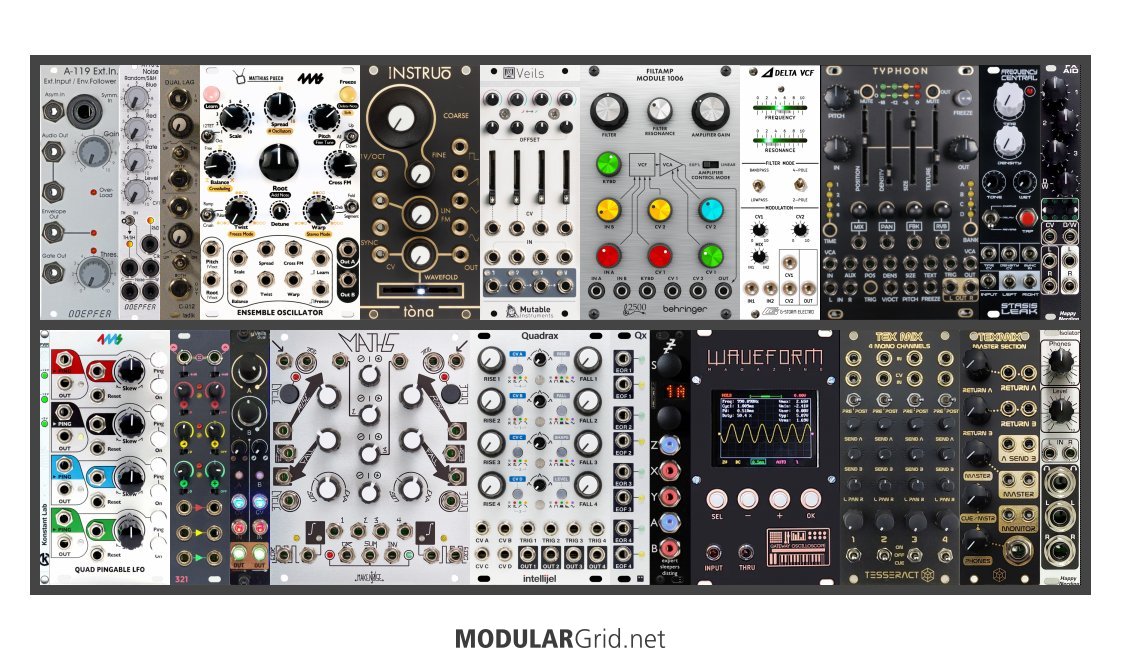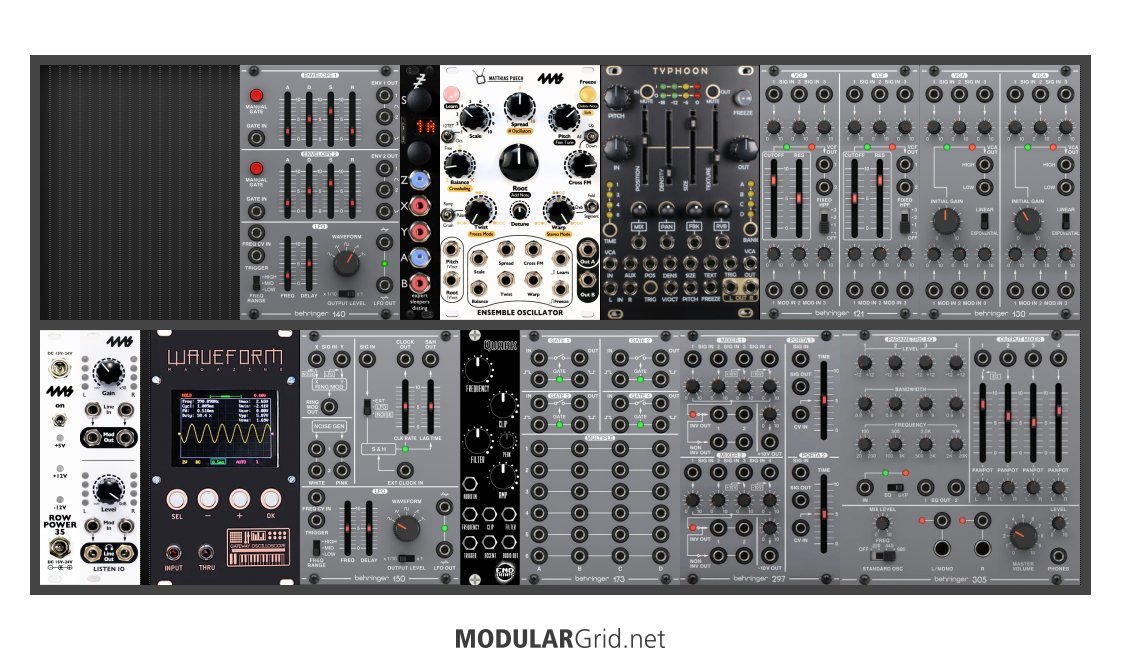The immediate issue with using the Behringer System 100M modules is that they're HUUUUGE. I did put a Behringer copy of the ARP 2500 Filtamp in, though...it's an excellent LPF, and it comes with a VCA at the output. But as for the rest...well, here it is:

Assuming that this is for a Tiptop Mantis cab, which has its own, beefier power, I removed the 4ms P/S. And as for percussion, most of us will tell you that using a standalone drum machine, instead of building one in a modular build, is the way to go. You can use it as a master clock for other things, plus you can get some of Uli's recent offerings. For example, I've got two RD-6s (they're not just drums...they also give you two channels of trigger sequencing per unit) and an RD-8mkii. Both are really pretty damn good as far as emulating the originals' sound. Anyway...
TOP: Doepfer A-119 gives you your audio in...plus an envelope follower and a comparator-derived gate out so that you can also impose dynamic contours from incoming signals on all sorts of other modules. Doepfer's little ring mod/S&H/noise is after that. Then I added a dual slew gen from Ladik that offers switchable discriminators so that you can have portamento on upward or downward CV movement...or you can set them so that they work like "normal" portamentos. Ensemble osc is after that, then an Instruo tona provides a second oscillator with a built-in waveshaper. Not only can you use the tona as a doubling VCO to make the 4ms oscillator obscenely fat, it's very capable as its own VCO voice due to that CVable waveshaper. Next, Veils...probably one of the best solutions for combining VCAs with a basic mixer that's got a "breakable" mixbus. Then there's the Filtamp (actually, it would be a kick and a half to use this with that Instruo waveshaping VCO!), and after that, a G-Storm fave. Their Delta VCF is a clone of the SSM filter that was used in Korg's Delta ensemble keyboard as well as in their Poly-61. It also gives you a bandpass filter setting. Typhoon follows, then I added a Freq Central Stasis Leak, which gives you stereo chorus, reverb, and a tap-tempo delay. And lastly, a Happy Nerding (damn, I hope he's OK!) FX Aid for even more effects fun (and you'll see why in a bit).
BOTTOM: First up, since you've not got front panel DC bus indicators on a Mantis, the Konstant Labs PWRchekr handles that duty. This lets you keep an eye on DC rail health over the system. Then the QPLFO after that is just nuts...it can work like your usual quad LFO, but it can also output waveforms with a duty cycle that can range from the low end of audio out to an utterly crazed 71 MINUTES! And for things such as generative work, something like that is super-helpful. Frap's 321 and the After Later Dual VCA (VCAs based on the Mutable topology, but in an x2 package) are your modulation modifier "core", allowing you to tamper with your modulation and get results that the modulator modules by themselves can't really do. Maths is next...y'know, Make Noise really made a killer-app-type module with that thing...and offers lots of modulation potential. Hell, you'll be finding new things that it can do for years! For envelopes (as well as some really complex chaining and other madness), I put in Intellijel's Quadrax with its Qx expander, the latter allowing you to chain envelopes and create ridiculously complex mod signals...or four envelope generators with CV over both rise and fall. Following that is the Disting...around mid-cab so that it's easy to drop into either the modulation OR audio paths. O-scope's after that...although I'll (and certainly others as well) tell you that unless this has some other features, you should drop it and use an external scope. Otherwise, it's a one-trick module that's occupying 15 hp that could be used for functional use instead. Anyway, following that is your mixer: a Tesseract Tex-Mix with four mono inputs. Also, these inputs have their own exponential VCAs, so that deals with the output level control. The Tex-Mix system also offers two FX busses (2 mono send, 2 stereo returns) for effects. So you could use the Typhoon as a "global" effect, or the FX Aid, and still have the 1-in/2-out Stasis Leak, which is perfect for the Tex-Mix effects busses. Note also that you can input mono to the FX Aid via the left input only. And last, a Happy Nerding Isolator, in their new mkii version (2 hp slimmer, plus an additional headphone preamp...giving you TWO headphone monitors, one of which can take the Tex-Mix's "cue" function so that you can have a dry pre-mix sound; this is the sort of thing that, if your tuning or something else goes wacky, you can put that channel on "cue", monitor that via the Tex-Mix phones to fix the issue, and go right on...with pretty much no one knowing that there was a problem.
Now, this is a pretty comprehensive system. It's definitely got more going on than the previous version, mainly due to the fact that you don't have a whole bunch of oversized modules stealing functional space. More expensive...but this is partly due to finishing the build out and also to not putting all of those B-100M modules in there. It's built tighter, which means more functionality and more sonic possibilities. See what you think...



